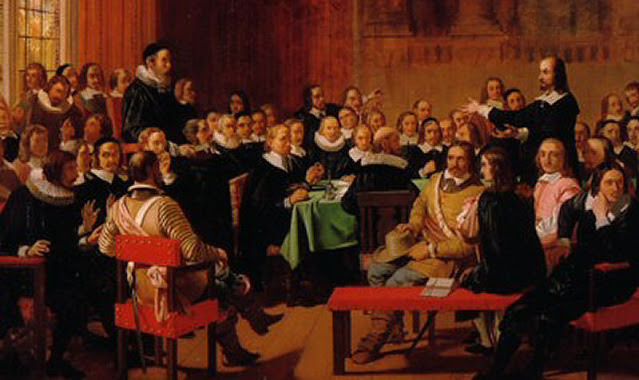Posted at Reformation Scotland:
Assuming that there is such a thing as truth versus error, how can we ever distinguish them? Some are afraid of discussing theology because it’s so easy to be taken in by subtle arguments, or because they believe it’s too difficult to explain sacred things to ordinary people. Others at the opposite extreme will argue about everything, even things as pointless as how many angels can dance on a pinhead. The Westminster divine John Ley of Solihull, Warwickshire went into print on multiple controversial issues as well as contributing to the discussions at the Westminster Assembly. He also wrote a discourse ‘On Disputations’ where he conceded that there is wisdom in avoiding religious disputes and highlighted the risk of being addicted to arguing for its own sake. Yet, as shown in the following updated and abridged excerpt from this discourse, he insisted that out of concern for people’s spiritual welfare, it is unloving to leave them to be choked with the chaff of error instead of ensuring that they get the finest wheat to feed on spiritually.SOME ARE TOO AVERSE TO DISPUTES
There is a danger that disputations in religion will be inconsiderately undertaken, or indiscreetly managed. As [the scholar] Ludovicus Vives put it, “The truth by too much scratching and alteration may be lost; and error by artificial arguments and ornaments may have such a glorious flourish and varnish set upon it, as to make it to be taken for the truth.”
This is not unlikely, for copper (he says) can sometimes have a more glorious lustre than true gold. Nothing, as Cicero observes, is so incredible, but by eloquence it may be made to appear probable; nothing is so horrid, but by a garnish of words it may be made to shine. This imposture is easily put on simple, ordinary people; for it is very easy with volubility of tongue to deceive. What people do not perceive with understanding, they receive with admiration; nor can they put a due difference betwixt garrulity and authority.
Ordinarily too, people are more affected by what is said by those who contradict solid and long-believed truth under pretence of new discoveries of truth, and more taken with error than with what has warrant from the Word of God and the consent of all the Christian churches of the world of both ancient and later times. Sometimes the fallacy is all the more attractive because these promoters of novel doctrines make an impressive profession of self-denial, refusing the advantages of a comfortable living, which their opponents enjoy, and they position themselves boldly against authority.
It is therefore wiser to be unwilling to give too much leeway to religious disputations (or rather, disputations of religion), partly because of the subtilty of some of unsound principles and partly because of the naivety of others of a better belief. They suspect no deceit, and they have confidence in the strength of truth, and so they are easily entangled with invitations to dispute. This brings the greatest disadvantage to their cause, for they do not forethink how their adversaries may be equipped for assault, and what liberties they will take when they report the outcome, either to make show of victory, or to shadow a foil.
There are also two great groups, which are opposites to each other, and which are too opposed to all disputations, namely the Muslims and the Pope.
Mohammed (that famous impostor and false prophet, the founder of that impious and impure sect of the Muslims) not only forbids all disputes about the religion of the Koran, but if any are disposed to dispute, he instructs his deluded disciples to answer them like this. “Say unto them,” says he, “‘God alone knows all thy acts, and at the last day will discuss all controversies.’ Again, to incredulous men say, ‘I follow not your law, nor you mine; therefore let me alone with that which is mine, and I will let you alone with yours.’”
Meanwhile, Pope Gelasius decreed against disputing with those who are of another communion, and Azorius the Jesuit in his Moral Institutes says that it is not lawful for laymen to dispute publicly about the faith. If there are any disputes of matters of faith between Catholics and heretics published in any mother tongue, they are forbidden in their Index of prohibited books.
